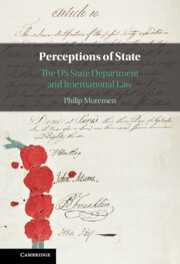Book contents
- Perceptions of State
- Perceptions of State
- Copyright page
- Contents
- Tables
- Preface and Acknowledgments
- 1 Introduction
- 2 Background Literature
- 3 State Compliance with International Law
- 4 Compliance by the United States
- 5 The Role of International Law in State Department Policymaking
- 6 The Trump Administration and International Law in the State Department
- 7 Conclusion
- Appendix Interview Subjects
- Index
5 - The Role of International Law in State Department Policymaking
Published online by Cambridge University Press: aN Invalid Date NaN
- Perceptions of State
- Perceptions of State
- Copyright page
- Contents
- Tables
- Preface and Acknowledgments
- 1 Introduction
- 2 Background Literature
- 3 State Compliance with International Law
- 4 Compliance by the United States
- 5 The Role of International Law in State Department Policymaking
- 6 The Trump Administration and International Law in the State Department
- 7 Conclusion
- Appendix Interview Subjects
- Index
Summary
Chapter Five examines the role of international law in State Department policymaking. It describes the formal and informal decision-making processes within the State Department, focusing on the influential role of the Legal Adviser and the Legal Adviser’s Office. The chapter then examines closely the weight given by policymakers to legal advice and the nature of the interaction between policymakers and lawyers. Policymakers, at least at higher levels, generally have final decision-making authority, but the views of the Legal Adviser’s Office can be determinative in the relatively rare instances when the lawyers deem a course of action conclusively illegal. Otherwise, the lawyers’ advice is influential, but its weight may vary depending on the circumstances, including the nature of the national interest involved. Many former officials indicated that the development of policy was often a collaborative and constructive process. The lawyers were usually willing to work with policymakers, and they were often willing to find alternative courses of action within the law, though they would not usually budge on an interpretation of the law. Some former officials indicated that their relationship involved greater contestation, resembling a negotiation. When international law conflicted with significant policy interests, policymakers could sometimes seek to overcome those obstacles.
Keywords
- Type
- Chapter
- Information
- Perceptions of StateThe US State Department and International Law, pp. 155 - 196Publisher: Cambridge University PressPrint publication year: 2024



